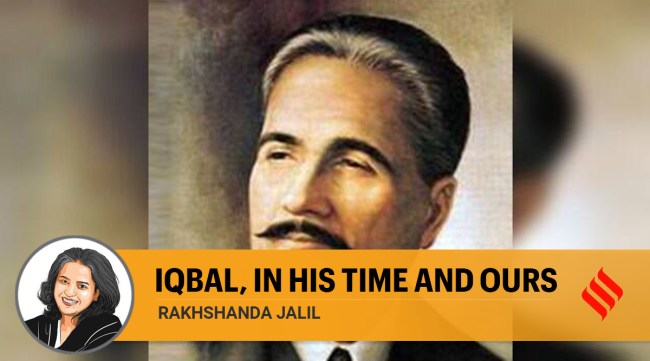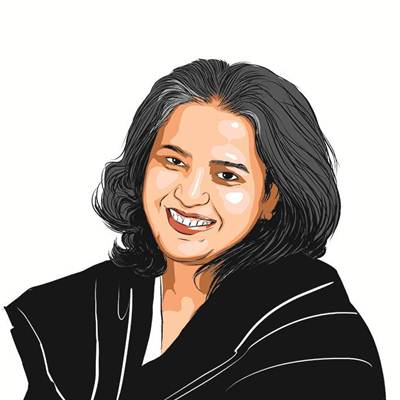Opinion Delhi University curriculum ‘rationalisation’: Why students’ need to study Pakistan’s national poet, Mohammad Iqbal
Rakhshanda Jalil writes: His articulation of Indian Muslims' disquiet must be seen in the context of his time – and ours
 Rakhshanda Jalil writes: Muhammad Iqbal was among the earliest to introduce socialism and the socialist movement to young people in India through his rousing poetry. (Credit: rekhta.org)
Rakhshanda Jalil writes: Muhammad Iqbal was among the earliest to introduce socialism and the socialist movement to young people in India through his rousing poetry. (Credit: rekhta.org) The recent dropping of Muhammad Iqbal from the Political Science curriculum of Delhi University should come as no surprise to anyone. His vilification as the “founder of the two-nation theory” has, for long, been compounded by what is seen as a passionate advocacy of a Muslim Renaissance and, by extension, pan-Islamism. Once anointed as the “national poet” of Pakistan, it naturally acquired the speed of a juggernaut in India in the years after Partition, leading in recent years to FIRs being filed against a teacher in Pilibhit and the principal of a government school in Bareilly for “making” children sing ‘Lab pe aati hai dua ban ke tamnna meri…’ in the school assembly. At its simplest, the inclusion of V D Savarkar and the exclusion of Iqbal from the curriculum completes the binary that defines New India. It would appear that one needs to demonise one in order to idolise the other.
One of the tallest poppies in the Urdu literary arena in the first three decades of the 20th century, Iqbal (1877-1938) moved from writing on specifically Indian subjects reflective of pluralism and multiculturalism to drawing upon world events to inspire, rouse and challenge the imagination of the Indian Muslims. He was among the earliest to introduce socialism and the socialist movement to young people in India through his rousing poetry. He also introduced modern philosophical concepts, gleaned from his study in Europe, and vastly broadened the scope of the existing intellectual discourse among educated Muslims, keeping it all the while tethered to its quintessentially religious moorings. In his passionate protests against the capitalist and imperialist forces, he propounded the message of “socialism” couched in Islam: The capitalist from the blood of workers’ veins makes himself a clear ruby;/ Landlords’ oppression despoils the villagers’ fields: Revolution!
Iqbal was among the first to take note of the disquiet that was affecting Indian Muslims and bring it within the ken of poetry — a disquiet that has, it must be noted, grown exponentially in recent times. For Iqbal, this disquiet found expression in different ways: There was sorrow over the loss of freedom or power of any Islamic race, whether in the distant past or the present; concern about the future of the Islamic countries subject to European hegemony; and suspicion and distrust of western powers that had plotted and brought about the downfall of Muslim rule.
The fate of fellow Muslims in different parts of the colonised world seemed to carry a portent of worse things in store for them in India. When a feted and lionised poet such as Iqbal penned poems such as Masjide-e-Qartaba (The Mosque at Cordoba) and O Ghafil Afghan (O Heedless Afghan), it fed a growing paranoia of a terrible misfortune that was waiting to befall the Muslims of the Subcontinent. While on the one hand, he remembered the glorious civilisation that had produced the splendid mosque at Cordoba, he was reminded also of the abject state of the Muslims in his time.
Drawing upon the best resources of a liberal Western education, Iqbal graduated from Government College, Lahore in 1899, worked as a lecturer in philosophy at the same college, went on to study philosophy at Trinity College, Cambridge and in Heidelberg and Munich in Germany and also took the Bar-at-Law from 1905-1908 and worked briefly as a lawyer. The philosophical essence of his writings is distilled in a series of six lectures delivered from 1928-29 at the universities in Aligarh, Hyderabad and Madras entitled ‘Reconstruction of Religious Thought in Islam’. In the light of influences as diverse as Nietzsche and Bergson and Marx, Iqbal produced what the Urdu critic Ale Ahmad Suroor has called the ‘New Testament of Urdu Poetry’. In collection after collection — from Baal-e-Jibreel (1935) to Zarb-e-Kaleem (1936) to Armaghan-e-Hijaz (1938) — Iqbal showed the limitless possibilities of human endeavour.
It is easy, with hindsight, to look at a poet’s shortcomings, to find fault with his political philosophy, to consider it confused, uneven, even flawed; but we would be guilty of a shortcoming of our own if we fail to at least acknowledge Iqbal’s fears. And, more importantly, if we fail to see him in the context of his time and age. One would have thought that, at the very least, his questioning of Western enlightenment and English materialism on philosophical and religious grounds should merit Iqbal a place in the curriculum of a course in Political Science.
The writer is a Delhi-based author, translator and literary historian





